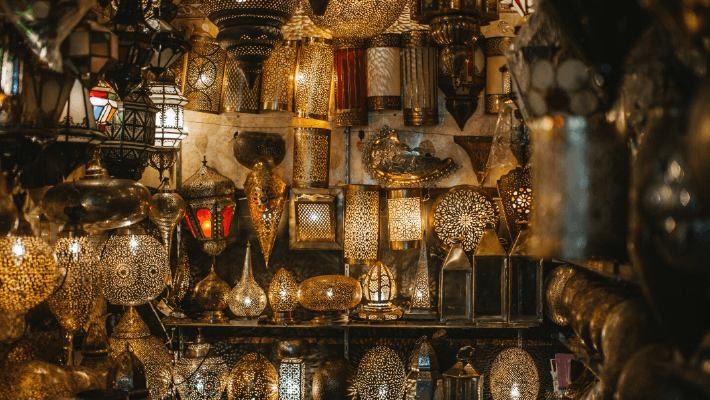Exploring Morocco's Rich Artisan Heritage

Exploring Morocco's Rich Artisan Heritage: A Guide to Traditional Crafts and Souvenirs
Morocco's traditional industry is a diverse, rich, and unique artisan heritage.Traditional crafts have formed a distinct field for crystallizing and embodying the skills and creations of Moroccan traditional craftsmen who have mastered the techniques of engraving, carving, and decoration. These craftsmen draw inspiration from nature and the various geometric shapes of the Moroccan cultural and civilizational heritage throughout the ages.
This national craft wealth, along with the common memory and values it brings, as well as practices, rituals, and expressions, has survived the fluctuations of globalization and the continuous development of production methods. It has established itself as an intangible cultural asset that enhances Moroccans' collective identity and supports the Moroccan economy. It also serves as a tool for contributing to Morocco's economic and social development through its revenue-generating activities.
Despite this, a group of traditional crafts is on the verge of extinction. Factors include the scarcity of raw materials, a significant decline in the number of skilled craftsmen who carry the knowledge, skills, and techniques associated with these crafts, and a lack of young people's demand for training to ensure the heritage's continuity and transmission between generations. Given the importance of these variables, the Ministry of Tourism, Handicrafts, Air Transport, and Social Economy places a strong emphasis on maintaining traditional crafts with cultural value, as well as knowledge and skills.
Genuine Leather Pillow Case
One of the traditional crafts of Morocco includes making Genuine leather pillow cases. These pillow covers are typically made of 100% real leather and feature intricate craftsmanship. The rear often includes an invisible zipper, and the joints are overlocked to ensure durability. Leather pillow cases add a touch of elegance to home decor and are valued for their quality and aesthetic appeal.
Moroccan Berber Carpets
Moroccan Berber carpets are another significant traditional craft. These carpets are often handwoven in the Atlas Mountains and made entirely with natural wool. The designs of these rugs are created in the pure Berber tradition, featuring various styles and images with symbolic origins. They are known for their contemporary, sophisticated, and environmentally friendly characteristics.
Ceramic Tagine Pots
In Morocco, ceramic tagine pots are a common sight, especially in Marrakech. These brightly painted pots are used for cooking traditional Moroccan dishes. Tagine-style pots for condiments, typically used for salt and cumin, are also popular. These ceramic items are not only functional but also serve as beautiful decorative pieces.
Argan Oil
is a unique product produced only in Morocco. This versatile oil can be used for both culinary and cosmetic purposes. In the kitchen, it is used as a flavorful ingredient, while in Moroccan skincare, it is renowned for its moisturizing and healing properties. Argan oil is often referred to as a "miracle in a bottle" due to its numerous benefits.
Babouches
Or Moroccan leather slippers, are iconic traditional footwear. These slippers are known for their vibrant colors and comfortable design. They are commonly seen in the markets of Medina and are favored for their soft leather that molds to the feet after a few wears. Babouche shoes with thicker rubber soles are also available for added durability.
Jewelry
Moroccan jewelry comes in a variety of styles, often reflecting the country's rich cultural heritage. In the bustling markets of Medina, shoppers can find an array of jewelry, from silver pieces to those adorned with semi-precious stones. The craftsmanship and intricate designs make Moroccan jewelry highly sought after by collectors and fashion enthusiasts alike.
Handbags & Purses
Handbags and purses crafted in Morocco are notable for their quality and design. These accessories often feature unique embellishments such as colorful pompoms and are made from materials like hessian. Moroccan handbags are versatile and can complement a wide range of outfits, making them a popular choice among visitors.
Blankets
Traditional blankets from Morocco, often referred to as Moroccan wedding blankets, are hand-embroidered with fringe and small ornamental pieces. These blankets are typically white and are given to women in mountain towns to commemorate their wedding day. They are known for their beauty and cultural significance.
Negotiating
Is an integral part of shopping in Morocco. Prices are not usually displayed on items, even in food markets, so buyers are expected to haggle with sellers. This practice is appreciated and considered a normal part of the shopping experience. Shoppers may notice prices drop significantly as they show reluctance to buy, which is a common tactic used by sellers.
We wish you a wonderful shopping experience in Morocco!
Deixe um comentário
Your email address will not be published. Required fields are marked *


